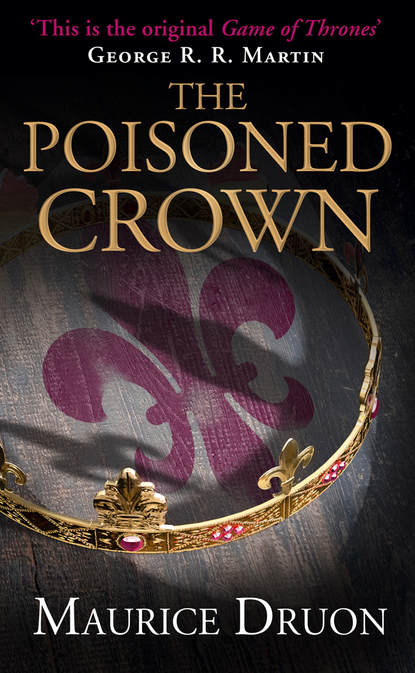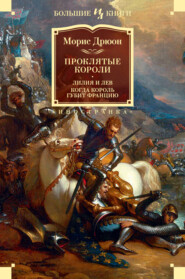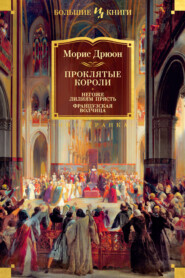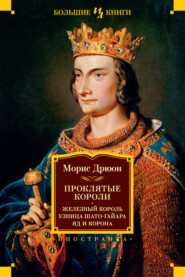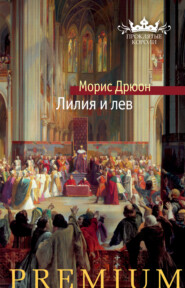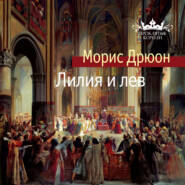По всем вопросам обращайтесь на: info@litportal.ru
(©) 2003-2025.
✖
The Poisoned Crown
Автор
Год написания книги
2019
Настройки чтения
Размер шрифта
Высота строк
Поля
During the battle itself all the knights would upon occasion, leaving their footmen to one side, rally for the charge, often with the splendid results we know so well.
The ‘banner’ of Count Philippe of Poitiers, the King’s brother, must have rallied something in the nature of an army corps, since it assembled all the troops from Poitou, together with those of the county of Burgundy of which Philippe was Count Palatine by marriage; moreover, ten knights banneret were administratively attached to it, among whom were the Count of Evreux, the King’s uncle, Count Jean de Beaumont, Miles des Noyers, Anseau de Joinville, son of the great Joinville, and even Gaucher de Châtillon who, even though Constable of France, that is to say Commander-in-Chief of the armies, had the troops from his fief incorporated into the enormous unit.
Philip the Fair had had good reason for confiding to his second son, before he even reached the age of twenty-two, so important a military command, and for concentrating under his authority, as if to reinforce it, the men in whom he placed the greatest confidence.
Under the ‘banner’ of Count Charles of Valois marched the troops from Maine, Anjou, and Valois, among whom was the old Chevalier d’Aunay, the father of Marguerite and Blanche of Burgundy’s two dead lovers.
The cities were laid under contribution no less than the country. For this Flanders army, Paris had to furnish four hundred horsemen and two thousand footmen, whose maintenance was guaranteed by the merchants of the Cité, fortnight by fortnight, which showed that in the King’s opinion the war would not last long. The horses and wagons for the supply train were requisitioned from the monasteries.
On July 24th, 1315, after some delay, as was always the case, Louis X received, at Saint-Denis, from the hands of the Abbot Egidus de Chambly, who was its ex-officio guardian, the Oriflamme of France, a long band of red silk embroidered with golden flames (from which its name derived), ending in a swallow-tail and attached to a staff of gilded brass. Beside the Oriflamme, which was venerated as might have been a relic, the two King’s banners were carried, one blue with fleurs-de-lys and the other with the white cross.
The huge army set itself in motion with all the contingents that had arrived from the west, the south, and the southeast, the knights from Languedoc, troops from Normandy and Brittany. At Saint-Quentin it was joined by the ‘banners’ of the duchy of Burgundy and those of Champagne, Artois, and Picardy.
That particular day was a rare one of sunshine in an appalling summer. The sun shone upon a thousand lances, on breastplates, and chain-mail, on brightly painted shields. The knights showed off to each other the latest fashions in armour, a new form of helm or bassinet giving greater protection to the face while affording a wider field of vision, or some larger form of ailette which, placed upon the shoulder, gave greater protection against the blows of maces or made sword-thrusts glance off.
Several miles behind the soldiers followed the train of four-wheeled wagons which carried food, forges, supplies of bolts for crossbows, and a variety of traders who were authorized to follow in the army’s wake, as well as whores by the cartful under the control of the brothel-masters. The whole procession advanced in an extraordinary atmosphere which smacked at once of the heroic and the fairground.
The next day rain began to fall once more, soaking, unceasing, flooding the roads, opening ruts, trickling down steel helmets, dripping from breastplates, plastering the horses’ coats. Every man weighed five pounds the heavier.
And it was rain, continuous rain, throughout the following day.
The army of Flanders never reached Courtrai. It stopped at Bonduis, near Lille, before the swollen river Lys, which barred its advance, flooded the fields, swamped the roads, and soaked the clay soil. As it was no longer possible to advance, the army encamped there in pouring rain.
6 (#ulink_54d8d18e-0e5a-57e3-a6f9-425531e0d6c0)
The Muddy Army (#ulink_54d8d18e-0e5a-57e3-a6f9-425531e0d6c0)
INSIDE THE VAST ROYAL TENT, embroidered with fleurs-de-lys, but where the mud was as elsewhere ankle-deep, Louis X, in company with his brother the Count de la Marche, his uncle Count Charles of Valois, and his chancellor, Etienne de Mornay, listened to the Constable Gaucher de Châtillon reporting on the situation. The report was not a happy one.
Châtillon, Count of Porcien and Lord of Crèvecoeur, had been Constable since 1286, that is to say from the very beginning of Philip the Fair’s reign. He had seen the disaster of Courtrai, the victory of Mons-en-Pevèle, and many other battles on this threatened northern frontier. He was in Flanders for the sixth time in his life. He was now sixty-five years of age. He was a tall good-looking man, with a determined jaw; neither years nor fatigue seemed to have affected him; he seemed slow because he was reflective. His physical strength and his courage in battle earned him respect as much as his strategical abilities. He had seen too much of war to be enamoured of it any longer, and now merely regarded it as a political necessity. He neither minced his words nor hid his meaning behind vainglorious phrases.
‘Sire,’ he said, ‘food supplies are no longer reaching the army, the wagons are stuck in the mud fifteen miles away, and they’re breaking the traces trying to get them out. The men are hungry and beginning to grumble angrily; the companies who still have food are having to defend their reserves against those who have nothing left; the archers of Champagne came to blows with those of Perche a little while ago, and there is a danger that your troops will fight among themselves before ever they come face to face with the enemy. I shall have to hang some of them, which is not a thing I like doing. But erecting gibbets does not fill stomachs. We’ve already got more sick than the surgeon-barbers can attend to; it will soon be the chaplains who’ll have most work to do. There has been no sign of a break in the weather in the last four days. Two days more and we shall have a famine on our hands, and no one will be able to stop the men deserting in search of food. All the supplies have gone mouldy, rotten, or rusty.’
He pulled off the steel camail which covered his head and shoulders and smoothed his hair. The King walked to and fro, nervous, anxious, and alarmed. From outside the tent came the sound of cries and the cracking of whips.
‘Stop that row,’ cried The Hutin, ‘one can’t hear oneself think!’
An equerry raised the flap of the tent. The rain was still falling in torrents. Thirty horses, sinking in the mud to their knees, were harnessed to a huge wine-cart which they were unable to draw.
‘Where are you taking that wine?’ the King asked the wagoners who were floundering in the clay.
‘To Monseigneur the Count of Artois, Sire,’ one of them replied.
The Hutin looked at them for a moment with his huge pale eyes, shook his head and turned away without another word.
‘As I was saying, Sire,’ Gaucher continued, ‘we may still have some wine to drink today, but don’t count on it for tomorrow. Oh, I should have given you more insistent counsel. I was of the opinion that we should have stopped earlier, establishing ourselves on high ground rather than advancing into this morass. Both my cousin of Valois
and yourself insisted that we should advance and I feared to be taken for a coward and that my age would be blamed if I stopped the army moving forward. I was wrong.’
Charles of Valois was about to reply when the King asked, ‘And the Flemings?’
‘They’re opposite us, on the other side of the river, in as great numbers as we and no more happy, I should think, though they are nearer their supplies, and are maintained by the people of their towns and villages. If the flood waters should diminish tomorrow, they’ll be better prepared to attack us than we shall be to fall on them.’
Charles of Valois shrugged his shoulders.
‘Come now, Gaucher, the rain’s depressed your spirits,’ he said. ‘You’re not going to make me believe that a good cavalry charge won’t account for that rabble of weavers. They’ve only got to see our lines of breastplates and our forest of lances to be off like a flock of sparrows.’
The Count was superb in his surcoat of gold-embroidered silk which he wore over his coat of mail and in spite of the mud that covered him; indeed, he looked more kingly than the King himself.
‘You make it quite clear, Charles,’ the Constable replied, ‘that you were not at Courtrai thirteen years ago. You were then fighting in Italy, not for France but for the Pope. But I’ve seen that rabble, as you call it, destroy our knights when they acted too precipitately.’
‘That was doubtless because I was not there,’ said Valois with his own peculiar conceit. ‘This time I am.’
The Chancellor de Mornay whispered into the ear of the young Count de la Marche, ‘It won’t be long before the sparks are flying between your uncle and the Constable; whenever they’re together one can set fire to the tinder without having to strike a light.’
‘Rain, rain!’ cried Louis X angrily. ‘Is everything always to be against me?’
Uncertain health, a clever but overbearing father whose authority had crushed him, an unfaithful wife who had scoffed at him, an empty treasury, impatient vassals always ready to rebel, a famine in the first winter of his reign, a storm which threatened the life of his second wife – beneath what disastrous conjunction of the planets, which the astrologers had not dared reveal to him, must he have been born, that he should meet with adversity in every decision, every enterprise, and end by being conquered, not even nobly in battle, but by the water and mud in which he had engulfed his army.
At this moment there was announced a delegation of the barons of Champagne, with the Chevalier Etienne de Saint-Phalle at their head, desiring an immediate revision of the Charter of Privileges which had been accorded them in the month of May; they threatened to leave the army if they did not receive satisfaction.
‘They’ve chosen a good day!’ cried the King.
Three hundred yards away, Sire Jean de Longwy, in his own tent, was conversing with a singular personage who was dressed half as a monk and half as a soldier.
‘The news you bring me from Spain is good, Brother Everard,’ said Jean de Longwy, ‘and I am glad to hear that our brothers of Castille and Aragon have resumed their Commanderies. They are better off than we, who must continue to act in silence.’
Jean de Longwy, short of stature and heavy-jowled, was the nephew of the Grand Master of the Templars, Jacques de Molay, of whom he considered himself the heir and successor. He had vowed to avenge the blood of his uncle and to re-habilitate his memory. The premature death of Philip the Fair, which fulfilled the famous triple curse, had not quenched his hate; he had transferred it to the Iron King’s heirs, Louis X, Philippe of Poiters, and Charles de la Marche. Longwy caused the Crown all the trouble he could; he was one of the leaders of the baronial leagues; and at the same time he was busily and secretly reconstructing the order of the Knights Templar, by means of a network of agents who maintained contact between the fugitive brothers.
‘I long for the King of France’s defeat,’ he went on, ‘and I am only present with the army in the hope of seeing him killed by a sword-thrust, and his brothers too.’
Thin, ungainly, his dark eyes set close together, Everard, a former Knight Templar, whose foot was deformed by the tortures he had undergone, replied, ‘I hope your prayers are answered, Messire Jean, if possible by God, and if not by the devil.’
The clandestine Grand Master
suddenly raised the tent-flap to make sure that no one was spying on them, and dispatched on some duty two grooms who were doing no more than shelter from the rain beneath the pent-roof of the tent. Then, turning back to Everard, he said, ‘We have nothing to hope for from the Crown of France. Only a new Pope could re-establish the Order, and restore to us our Commanderies here and overseas. Ah, what a wonderful day that would be, Brother Everard!’
For a moment or two both men dreamed. The destruction of the Order dated only from eight years before, its condemnation from still less, and it was barely more than a year since Jacques de Molay had died at the stake. All their memories were fresh, their hopes alive. Longwy and Everard could see themselves donning once more the long white cloaks with their black crosses, the golden spurs, exercising the ancient privileges and indulging once again in great commercial activities.
‘Very well, Brother Everard,’ Longwy went on, ‘you will now go to Bar-sur-Aube, where the Count de Bar’s chaplain, who is well disposed towards us, will give you a position as a clerk so that you need no longer live in concealment. Then you will go to Avignon, from where I am informed that Cardinal Duèze, who was a creature of Clement V’s, has once again a considerable chance of being elected. This we must prevent at all costs. Find Cardinal Caetani – if he is not at Avignon, he will not be far away – who is nephew of the unfortunate Pope Boniface and is also resolved to avenge the memory of his uncle.’
‘I guarantee he’ll receive me well, when he hears that I have already assisted his vengeance by helping to send Nogaret out feet first. You’re creating a league of nephews!’
‘That’s exactly it, Everard. So see Caetani and tell him that our brothers in Spain and England, and all those in France in whose name I speak, have chosen and desired him in their hearts as Pope and are ready to support him, not only with prayers, but by every means in their power. Put yourself under his orders for whatever he may require of you. And, while you’re there, see also Brother Jean du Pré who’s in those parts at the moment and may be of great help to you. And don’t fail to learn during the journey if there be any of our old Brothers in the neighbourhood. Try to organize them into little companies, and get them to take the oath you know. That’s all, Brother; this safe-conduct, which names you Chaplain-Brother of my “banner”, will help you to leave the camp without being asked awkward questions.’
He handed the ex-Templar a document and the latter slipped it under the leather jerkin which covered his rough serge robe down to the thighs; then the two men embraced. Everard put on his steel helmet and left, his back bent, his walk limping beneath the rain.
The Count of Poitiers’s troops were the only ones who still had anything to eat. When the wagons had begun to stick in the mud, the Count of Poitiers had ordered the food to be portioned out and carried by the foot-soldiers. At first they had complained; today they blessed their commander. A strict guard maintained discipline, since the Count of Poitiers loathed disorder; and since he also appreciated his comforts, a hundred men had been put to digging drains, while his tent had been placed on a foundation of logs and faggots upon which one might live more or less in the dry. The tent, almost as large and rich as the King’s, consisted of several different rooms separated by tapestries.





